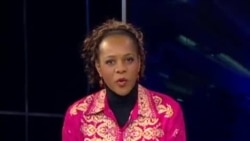The Washington, DC, area is home to thousands of immigrants from Africa. Some came to study, others came for work, and many have made the U.S. capital their second home, like Ugandan Betty Wamala-Osborne.
She wakes up every day at 6 o’clock in the morning and heads to work. Thirty minutes later she is ready for her first session at Washington Sports Club, where she works as a personal trainer.
Her love for fitness started at an early age.
"Ever since I was young I was always interested in sports; track and field, volleyball even though I am short,” she said.
Wamala-Osborne has been working for the fitness center in the District of Columbia for five years.
“Everybody comes in early morning, lunch time to take classes and in the evening for zumba or sports conditioning,” she said.
But she's not just an ordinary personal trainer.
"I am a corrective training specialist," she explained, "who’s border line physical therapist. If someone comes in and say they have an issue with their back, I have to assess them and see why do they have a back injury. If they’ve gone to the doctor, they’ll come in with exercises and I would work on them and implement all my exercise from corrective training and usually within seven to eight weeks they are back to doing everything they need to do. ”
She was born in Uganda, but spent some of her childhood in Kenya. She also lived in London before coming to the United States. She went to school at Strayer University for her bachelors degree and attended George Washington University for her masters. To make ends meet as a student, she once worked as a babysitter as well.
“Babysitting was really a good job," she said, "because they’ll feed you; give you a car to drive the kids to school and you learn a lot.”
Although she’s busy making sure others are in good shape, she doesn’t neglect herself, because her health and image play a big role in this field.
“I have to show my clients what they are asking for. If they see that i look good then they are encouraged to come and train with me.”
But, working out is not the only thing she does in Washington.
“What do i do for fun? I like to go to the movies on the weekends or go out to dinner with friends,” she explained.
But during the week, she works long hours and can’t wait to get home and refuel for the next day. She says she misses her family and hopes to return some day. African immigrants make up 17 percent of the foreign born population in washington. That’s according to the mayor’s office, which ranks Ethiopia, Nigeria and Ghana as the top countries of origin for most immigrants.





